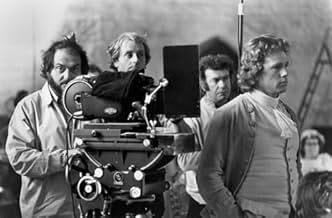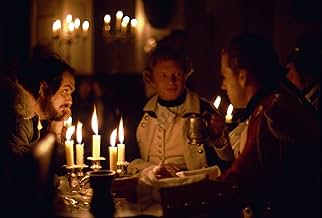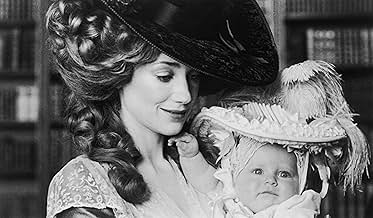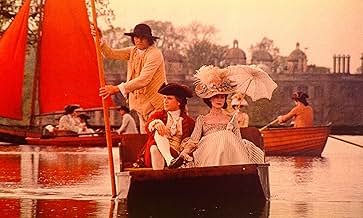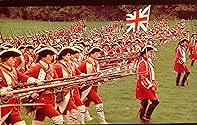Barry Lyndon
- 1975
- Tous publics
- 3h 5min
En Angleterre au dix-huitième siècle, un Irlandais malhonnête gagne le coeur d'une veuve riche et assume la position aristocratique de son mari décédé.En Angleterre au dix-huitième siècle, un Irlandais malhonnête gagne le coeur d'une veuve riche et assume la position aristocratique de son mari décédé.En Angleterre au dix-huitième siècle, un Irlandais malhonnête gagne le coeur d'une veuve riche et assume la position aristocratique de son mari décédé.
- Réalisation
- Scénario
- Casting principal
- Récompensé par 4 Oscars
- 17 victoires et 14 nominations au total
Hardy Krüger
- Capt. Potzdorf
- (as Hardy Kruger)
Diana Körner
- Lischen - German Girl
- (as Diana Koerner)
André Morell
- Lord Gustavus Adolphus Wendover
- (as Andre Morell)
Résumé
Reviewers say 'Barry Lyndon' is acclaimed for its breathtaking cinematography, intricate period details, and masterful use of natural light, often likened to fine art. It explores themes of human folly, the quest for wealth and status, and the resulting downfall. However, some criticize its slow pace, the perceived lack of emotional depth in characters, especially Ryan O'Neal's performance, and its lengthy runtime. Despite these drawbacks, many regard it as a significant artistic achievement and a standout in Kubrick's oeuvre.
Avis à la une
The genius Stanley Kubrick has truly outdone himself by crafting this masterpiece. After viewing A Space Odyssey, I thought there were no films more beautiful, but the breathtaking painting-like scenes of Barry Lyndon paired with music exquisitely chosen by Kubrick are simply stunning. There are some who may say that this film is too long or stale, but I say, that this film must be savoured slowly, and that one must enjoy it for what it is, which is almost like a series of ethereal paintings, one after another. Watch this film not for the end, but watch it and live with the fact that every scene is a part of the whole, and that the wholeness and oneness in itself is beautiful. Say, if we only watched movies for the ending, then composers who only wrote finales would be the greatest. All you must do is to simply sit down and relax, then, nothing else except absolute enchantment can possibly follow.
Some movies - I wish there were more of them - simply look like a series of great paintings. This film has that look. You could freeze-frame many of the scenes and swear you were looking at a Gainsborough, a Vermeer, a Hogarth or similar work of art by one the great artists of three to five centuries ago. It's just beautiful.
For that, we have Director Stanley Kubrick and Photographer John Alcott to thank. Being a three-hour movie, there are plenty of wonderful shots to admire, too. In addition, the costumes are lavish and authentic and the scoring is notable. It's no accident that Oscars were garnered for art/set direction, cinematography, costume design and scoring. Yeah, if you enjoy classical music, you'll really enjoy the soundtrack, too, under the guidance of conductor Leonard Roseman.
Not to be overlooked is the fine acting and the interesting and underrated story. I say "underrated" because this film, from what I've read, bored a lot of people and and it was a box-office flop. That's too bad because, frankly, I found the story (outside of the first 10--15 minutes) to be fascinating. As I watched, I kept wondering what strange occurrences will happen next to the lead character, "Redmond Barry/Barry Lyndon," played beautifully by Ryan O'Neal. (For most of the movie, he's called "Redmond Barry," so I will refer to him as that.)
Overall, this was a low-key adventure story about the rise-and-fall of a "scoundrel" back in late 18th century Englishman. "Mr. Barry" is an Irishmen living in England who winds up dealing with a number of people: Irish, English, Prussian, French. His dealings with these people are bizarre at times. While he mainly is shown doing what he can to promote himself, for either monetary gain and prestige of a name and power, he's not all bad. There is a compassionate side to him, but it only shows itself in small doses. It makes him all the more interesting to watch, because you don't always know how he's going to react to his circumstances, which change radically every few years.
We witness his rise to prominence and then his fall when his "sins begin to find him out," as the Bible would describe. It's quite a roller coaster ride.
This is an emotional, involving story, and a feast for the eyes and ears. It's quite different, too, certainly not the average fare from Kubrick. I can only hope this comes out on a high-definition disc some day. Admirers of this film need to see this in all its glory.
For that, we have Director Stanley Kubrick and Photographer John Alcott to thank. Being a three-hour movie, there are plenty of wonderful shots to admire, too. In addition, the costumes are lavish and authentic and the scoring is notable. It's no accident that Oscars were garnered for art/set direction, cinematography, costume design and scoring. Yeah, if you enjoy classical music, you'll really enjoy the soundtrack, too, under the guidance of conductor Leonard Roseman.
Not to be overlooked is the fine acting and the interesting and underrated story. I say "underrated" because this film, from what I've read, bored a lot of people and and it was a box-office flop. That's too bad because, frankly, I found the story (outside of the first 10--15 minutes) to be fascinating. As I watched, I kept wondering what strange occurrences will happen next to the lead character, "Redmond Barry/Barry Lyndon," played beautifully by Ryan O'Neal. (For most of the movie, he's called "Redmond Barry," so I will refer to him as that.)
Overall, this was a low-key adventure story about the rise-and-fall of a "scoundrel" back in late 18th century Englishman. "Mr. Barry" is an Irishmen living in England who winds up dealing with a number of people: Irish, English, Prussian, French. His dealings with these people are bizarre at times. While he mainly is shown doing what he can to promote himself, for either monetary gain and prestige of a name and power, he's not all bad. There is a compassionate side to him, but it only shows itself in small doses. It makes him all the more interesting to watch, because you don't always know how he's going to react to his circumstances, which change radically every few years.
We witness his rise to prominence and then his fall when his "sins begin to find him out," as the Bible would describe. It's quite a roller coaster ride.
This is an emotional, involving story, and a feast for the eyes and ears. It's quite different, too, certainly not the average fare from Kubrick. I can only hope this comes out on a high-definition disc some day. Admirers of this film need to see this in all its glory.
10Spleen
In fact it's one of Kubrick's most gripping pictures, with a narrative drive second only to that of "Dr. Strangelove" (and it's unquestionably a more glorious creation than, say, anything he made in the 1950s). English director Michael Powell (while attributing a similar failing to one of his own works) says that Kubrick fell into "the trap of the picturesque", but while I admire Powell as a creator, the judgment is absurd: at the VERY least, each lush image shows us people not just occupying a part of the screen but inhabiting a world, and tells us much about their relation to that world. Many shots are indeed amazing and beguile the eye, but they don't have the effect they do simply because they would make nice postcards.
THIS, I feel sure (without having read Thackeray), is the proper way to adapt a long story from novel to screen. Each scene is either allowed as much time as it needs to make its point and its impact, or it's cut altogether - you won't catch Kubrick skating too quickly over his material for no better reason than to fit it all in. The third-person narration (consisting of witty, beautifully crafted sentences - it's about time I did read Thackeray) almost performs a kind of dance with the images, gliding in just when we need it, taking a step back when we don't. (So rarely is even third-person narration used so well.) And as always, Kubrick's musical sense is unerring. My impression at the time was that I was listening to mid-eighteenth century music that gave way to pieces from the classical era as the hero started to move in higher and higher circles. I was more or less right. But then I noticed Schubert's name in the credits - and I realised with a start that I'd been listening to, had even started tapping my feet to, a Schubert piece I was familiar with, without the anachronism registering.
It's a pity Kubrick stopped making epics after this. Look at the ones he's responsible for: "Spartacus" (not a project Kubrick was fond of, admittedly, but still the most magnificent of all Roman epics) "2001" (the most magnificent of ALL epics), and "Barry Lyndon". The last of the three is by no means a poor cousin.
THIS, I feel sure (without having read Thackeray), is the proper way to adapt a long story from novel to screen. Each scene is either allowed as much time as it needs to make its point and its impact, or it's cut altogether - you won't catch Kubrick skating too quickly over his material for no better reason than to fit it all in. The third-person narration (consisting of witty, beautifully crafted sentences - it's about time I did read Thackeray) almost performs a kind of dance with the images, gliding in just when we need it, taking a step back when we don't. (So rarely is even third-person narration used so well.) And as always, Kubrick's musical sense is unerring. My impression at the time was that I was listening to mid-eighteenth century music that gave way to pieces from the classical era as the hero started to move in higher and higher circles. I was more or less right. But then I noticed Schubert's name in the credits - and I realised with a start that I'd been listening to, had even started tapping my feet to, a Schubert piece I was familiar with, without the anachronism registering.
It's a pity Kubrick stopped making epics after this. Look at the ones he's responsible for: "Spartacus" (not a project Kubrick was fond of, admittedly, but still the most magnificent of all Roman epics) "2001" (the most magnificent of ALL epics), and "Barry Lyndon". The last of the three is by no means a poor cousin.
Barry Lyndon (1975) has to be Stanley Kubrick's most realized project that he has ever taken. A big task for the maverick director. For a film like this to be made during the free wheeling seventies had to take some big stones. One must admire Mr. Kubrick for even trying to produce and direct such a complex and expensive film that had all the ear markings of a financial and personal disaster. Not only did Kubrick manage to out do his last epic "2001" but he has created a movie that not only showcases the untapped acting abilities of Ryan O'Neil, but a beautifully lensed film that uses minimal lighting , gorgeous sets, perfect balance, positioning and meticulous timing. I have never seen such a magnificent film such as this one. Every shot and frame plays out like an eighteenth century oil painting.
A young Irish man of lower class has the strangest quirk of luck. After participating in an illegal duel, young Barry is forced to flee from his home village. After being accosted by some gentlemanly highway robbers, Barry winds up cross country and becomes a conscripted soldier. Rising in rank, Barry is sent to fight in the Seven's Year War. Whilst in battle he watches his friends and fellow soldiers being slaughtered in combat due to poor tactics and leadership. Having enough of this life of hardship and struggle, Barry uses his god given talents to do what he has to do in order to survive and become a man of proper social standing.
I was very impressed with this movie. I've put off watching this film until recently. Some have told me how long and boring this movie was. Others have said it was pretty self serving and not worth watching. But after seeing part of it on T.C.M., I just had to find a copy of my own. The film is over three hours in length but they go by very quickly because Barry's story is so captivating. Kubrick poured his heart and soul into this film. The results are on the screen. He's clearly a master film maker. His reputation is cemented forever with this movie. Ryan O'Neil impressed the hell out me with his role as Barry Lyndon. He gives the character some dignity and depth that no other actor could have possibly given to the title role.
Overall I would have to give this film one of my highest recommendations. This is one of my top ten films of all time. If people tell you not to watch this masterpiece ignore them. I advise you to get a copy and enjoy. For a film like this you need to set aside a weekend afternoon to fully appreciate a film such as this. Believe me you will not regret it.
Highest recommendation possible.
It doesn't matter whether you watch it on D.V.D. or V.C.D. because the transfers are excellent on either format.
A young Irish man of lower class has the strangest quirk of luck. After participating in an illegal duel, young Barry is forced to flee from his home village. After being accosted by some gentlemanly highway robbers, Barry winds up cross country and becomes a conscripted soldier. Rising in rank, Barry is sent to fight in the Seven's Year War. Whilst in battle he watches his friends and fellow soldiers being slaughtered in combat due to poor tactics and leadership. Having enough of this life of hardship and struggle, Barry uses his god given talents to do what he has to do in order to survive and become a man of proper social standing.
I was very impressed with this movie. I've put off watching this film until recently. Some have told me how long and boring this movie was. Others have said it was pretty self serving and not worth watching. But after seeing part of it on T.C.M., I just had to find a copy of my own. The film is over three hours in length but they go by very quickly because Barry's story is so captivating. Kubrick poured his heart and soul into this film. The results are on the screen. He's clearly a master film maker. His reputation is cemented forever with this movie. Ryan O'Neil impressed the hell out me with his role as Barry Lyndon. He gives the character some dignity and depth that no other actor could have possibly given to the title role.
Overall I would have to give this film one of my highest recommendations. This is one of my top ten films of all time. If people tell you not to watch this masterpiece ignore them. I advise you to get a copy and enjoy. For a film like this you need to set aside a weekend afternoon to fully appreciate a film such as this. Believe me you will not regret it.
Highest recommendation possible.
It doesn't matter whether you watch it on D.V.D. or V.C.D. because the transfers are excellent on either format.
Kubrick's adaptation of Thackeray's Barry Lyndon sharply divides fans of the great director's work, as the languid pace and seemingly interminable running time -- not to mention Ryan O'Neal's questionable performance in the title role -- are cherished by some and deplored by others. Little argument will be made against John Alcott's Academy Award-winning cinematography or Ken Adam's production design, however, and Kubrickian motifs are manifest in the gallery of characters' wide-ranging displays of cowardice, guile, duplicity, avarice, jealousy, greed, and cruelty. Marisa Berenson is terribly short-changed in her role as the Lady Lyndon, but a number of other performers are given the opportunity to create a handful of memorable moments -- especially Arthur O'Sullivan (albeit briefly) as the charming, intelligent highwayman and Patrick Magee as the Chevalier. Love it or hate it, Barry Lyndon will remain essential viewing for aficionados of the director, who enjoys taking his usual shots at the more discouraging aspects of human behavior.
Le saviez-vous
- AnecdotesProduction was moved from Ireland to England after writer, producer, and director Stanley Kubrick received word that his name was on an I.R.A. hit list for directing a movie featuring English soldiers in Ireland. Consequently, several scenes were dropped.
- GaffesThe narrator states, early on, "About this time, the United Kingdom was in a state of great excitement". The United Kingdom came into being in 1801, when it merged with the Kingdom of Ireland, before which it was known merely as the Kingdom of Great Britain. In fact the Act of Union of 1707, which joined England and Scotland, refers to "the United Kingdom of Great Britain" or "the United Kingdom" throughout the text. "United Kingdom" was in common use at the time of the film.
- Citations
Title card: [End title card] EPILOGUE
Title card: It was in the reign of George III that the aforesaid personages lived and quarreled; good or bad, handsome or ugly, rich or poor they are all equal now
- Versions alternativesThe 2011 Blu-ray plastered the opening Saul Bass variant of the Warner Bros. Pictures logo with the black and white WB shield.
- ConnexionsEdited into Hai-Kubrick (1999)
- Bandes originalesPiano Trio in E-flat, Op 100 (second movement)
Composed by Franz Schubert
piano: Anthony Goldstone
cello: Moray Welsh
violin: Ralph Holmes
Meilleurs choix
Connectez-vous pour évaluer et suivre la liste de favoris afin de recevoir des recommandations personnalisées
Détails
- Date de sortie
- Pays d’origine
- Langues
- Aussi connu sous le nom de
- Баррі Ліндон
- Lieux de tournage
- Sociétés de production
- Voir plus de crédits d'entreprise sur IMDbPro
Box-office
- Budget
- 11 000 000 $US (estimé)
- Montant brut mondial
- 284 426 $US
- Durée3 heures 5 minutes
- Couleur
- Mixage
- Rapport de forme
- 1.66 : 1
Contribuer à cette page
Suggérer une modification ou ajouter du contenu manquant





